The Year Everything Changed
2025-01-04 - by Joseph Chin
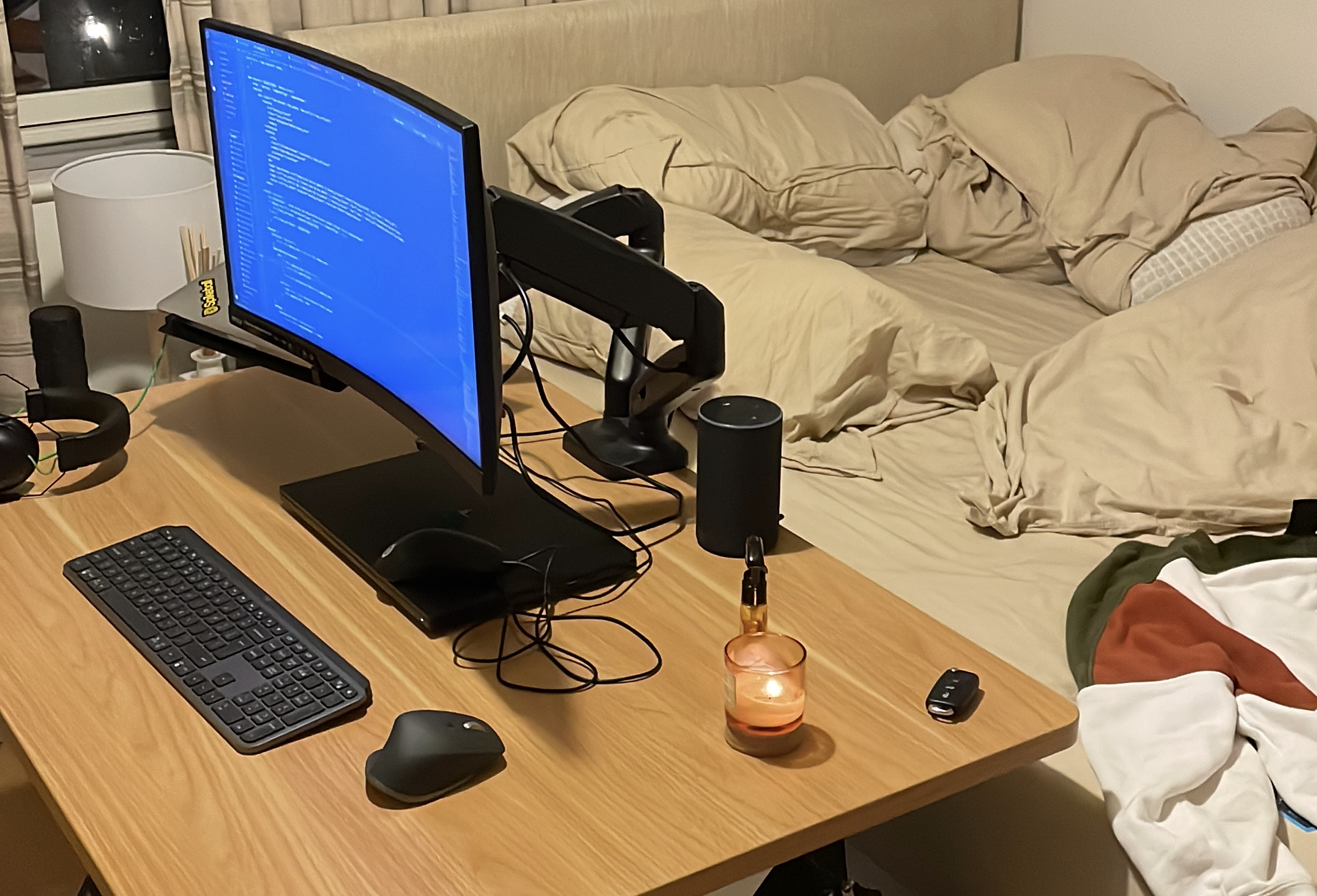 I had just broken my foot... give me a break for the messy room 😂
I had just broken my foot... give me a break for the messy room 😂
I was sitting in my London flat, staring at my screen as ChatGPT churned out another piece of code that would have taken me hours to write. My mind wasn't on the AI revolution though - it was on a much simpler calculation I'd been avoiding:
If I kept living 7,000 miles from my parents, seeing them once a year (in good times), how many more times would I see them before...?
I couldn't finish the thought.
The COVID years had forced this math into sharp focus. Stuck in the UK while Malaysia's borders were sealed, I watched my laptop screen become a window into my family's lives. Birthdays. Celebrations. The quiet moments in-between. All through a digital barrier that felt increasingly impossible to breach.
"I'm a software engineer," I kept telling myself. "London is where the opportunities are. Especially with AI changing everything."
But that simple calculation kept nagging at me: Time. Family. Distance.
Sometimes the biggest changes in your life come from the smallest numbers.
I never expected that moving closer to my parents would lead to building a product used by 160,000 people, or creating one of Malaysia's fastest-growing AI communities. I definitely didn't expect to find myself in meetings with billion-dollar fund managers just over a year later.
But here's the thing about life-changing years: They rarely announce themselves in advance.
This is a story about what happens when you stop planning and start doing. When you trust that the wind might just blow in the right direction, even if you can't see where it's taking you.
And it all started with a simple question about time.
The Leap
Here's the funny thing about moving to Malaysia: I was Malaysian, but I wasn't from Malaysia.
Sure, my dad is Malaysian. But I grew up in Indonesia, spent my adult life in the UK, and had about as much insight into the Malaysian tech scene as I did into quantum physics. Looking back, that turned out to be perfect.
"What's your plan?" people kept asking.
I had two answers:
- The official one: "I'm going to explore opportunities in the AI space while being closer to family."
- The honest one: "I have no f*cking clue."
Being what I lovingly call "this random kid" who just showed up in Malaysia's tech scene turned out to be my secret weapon. No preconceptions about what was possible or impossible. No reputation to protect. No existing relationships to navigate. Just pure, unfiltered curiosity and an audacious optimism that only comes from not knowing enough to be scared.
Those first few months were a blur of experiments. During the days, I was tinkering with AI technologies, building what would eventually become DocuAsk - though I had no idea then that it would grow into something so impactful to my life. It started as a simple "what if" project, playing with an emerging technology called RAG that wasn't yet on everyone's radar.
But building products in isolation feels empty. I kept thinking about how the AI revolution was going to reshape everything - not just for software engineers like me, but for everyone. And Malaysia, with its amazing tech talent and hunger for innovation, needed a space for people to explore this together.
That's how the idea for an AI Tinkerers chapter was born. Not as some grand vision for all of Malaysia's most passionate tech talent (spoiler alert: that came later), but as a simple thought: "What if we got people together to actually build stuff with AI?"
By May, I was ready to test this idea. My first AI Tinkerers event had exactly six people show up. It was, to use a technical term, super cringe. The kind of event where you seriously question all your life choices while pretending everything is going according to plan.
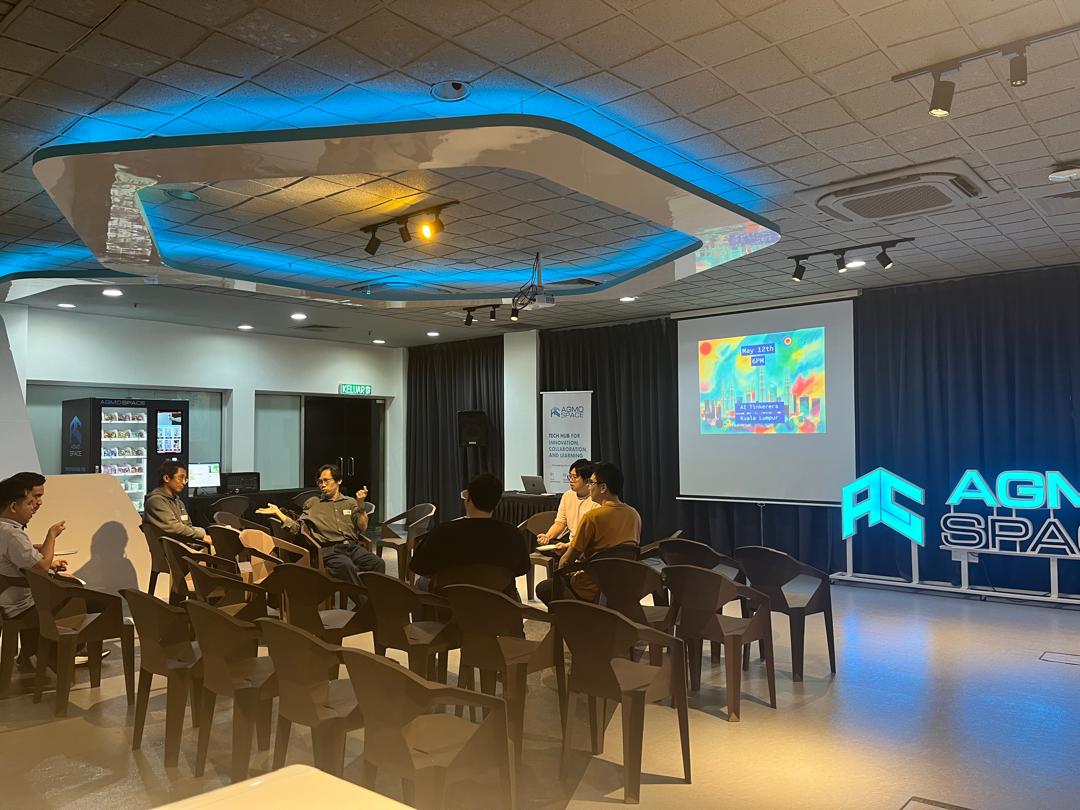 Our very first event..
Our very first event..
I had no idea that Malaysia's tech scene was about to show me exactly what was possible.
But we'll get to that.
First, let me tell you about the moment everything started to shift...
The Mosaic of Miraculous Moments
Looking back, it's tempting to draw straight lines between each moment. To pretend there was some master plan. But that would be lying to you.
The bigger lie? Pretending I even know which moments mattered most. Every time I tell this story, I find myself picking different pieces, seeing different patterns. The truth is, I'm probably getting it wrong - missing the real turning points, overlooking the tiny decisions that made all the difference.
Instead, picture a mosaic. Each piece, on its own, might look random. But step back, and you start to see a pattern that's almost too perfect to be coincidental.
So here are some pieces that feel meaningful today - though ask me again tomorrow, and I might tell you a completely different story:
The Langchain Connection
It started with RAG - Retrieval Augmented Generation. Back in early 2023, it was this fascinating piece of tech originally built for language models, not LLMs. We had GPT-3 sitting there with its tiny 4k context window (later 16k with GPT-3.5), and we're looking at this RAG thing thinking: "This could be interesting with our new LLM magic machine."
Me and another developer started playing around. Found some cool stuff - Shadcn, and some other bits and pieces. You know, the tinkering you do when you're not trying to build anything serious, just seeing what's possible. We were using this (then) relatively niche little framework called LangChain (maybe you’ve heard of it- today, they’re kind of a big deal).
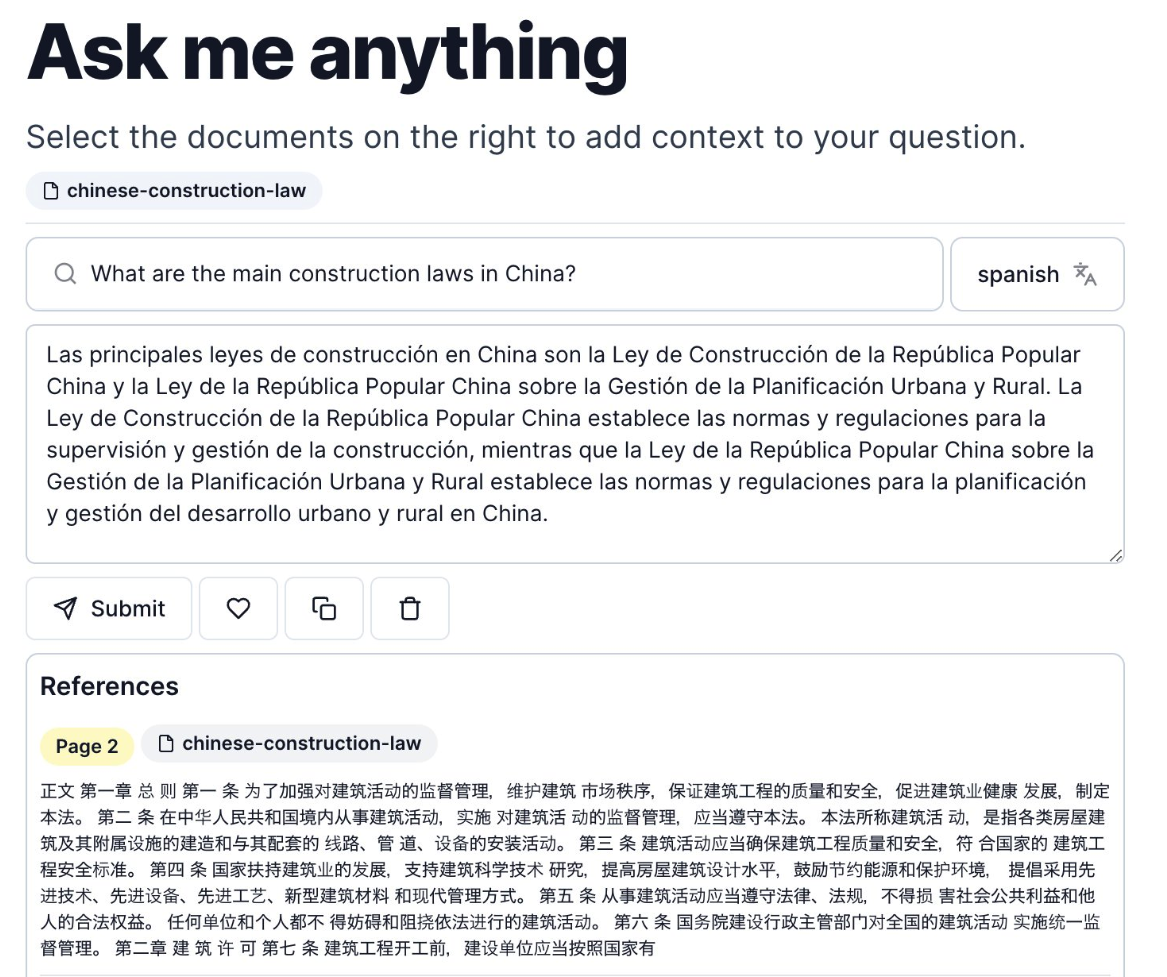 An Early Version of the DocuAsk Lander
An Early Version of the DocuAsk Lander
You know when you're just messing around with something for fun, and then suddenly it feels like the universe is trying to tell you something?
We shared what we'd built with Harrison Chase, Langchain's co-founder. Just threw it out there, the way you do when you're too tired to second-guess yourself.
His response? "Wow. This is awesome."
I must’ve read that message twenty times, because trust me, when you're a no-name developer building for fun, having Harrison Chase call your project "awesome" feels like... magic.
Then he shared it on twitter.
Boom. Our first 1000 users.
My co-builder saw it differently. For him, it was a cool experiment, nothing more. But I couldn't let it go. Something about the way people were using it, the problems they were solving - it kept pulling at me. Like there was something bigger here, if I could just figure it out.
That project became DocuAsk. As I write this, it has 160,000 users. We're generating $100,000 in annual recurring revenue, heading toward $150,000. Numbers that still don't feel real when I type them.
But building products in isolation is a lonely thing. Even with the numbers slowly growing, something felt missing.
The Community Catalyst
It started small. A conversation about building an AI community in Malaysia, a random connection through someone in Singapore, a coffee meeting that could have been just another coffee meeting.
What I found was a small but inspiring group of people (Ben & Wei) running study sessions on Luma. Just a handful of passionate folks getting together to work on AI projects. Meanwhile, I'd just run my first AI Tinkerers event (if you can call it that).
We met for coffee a couple weekends in a row. Sharing ideas, comparing notes. Then Wei casually mentioned something innocuous: "If you're looking for a place to host the next AI Tinkerers, you can do it at MoneyLion."
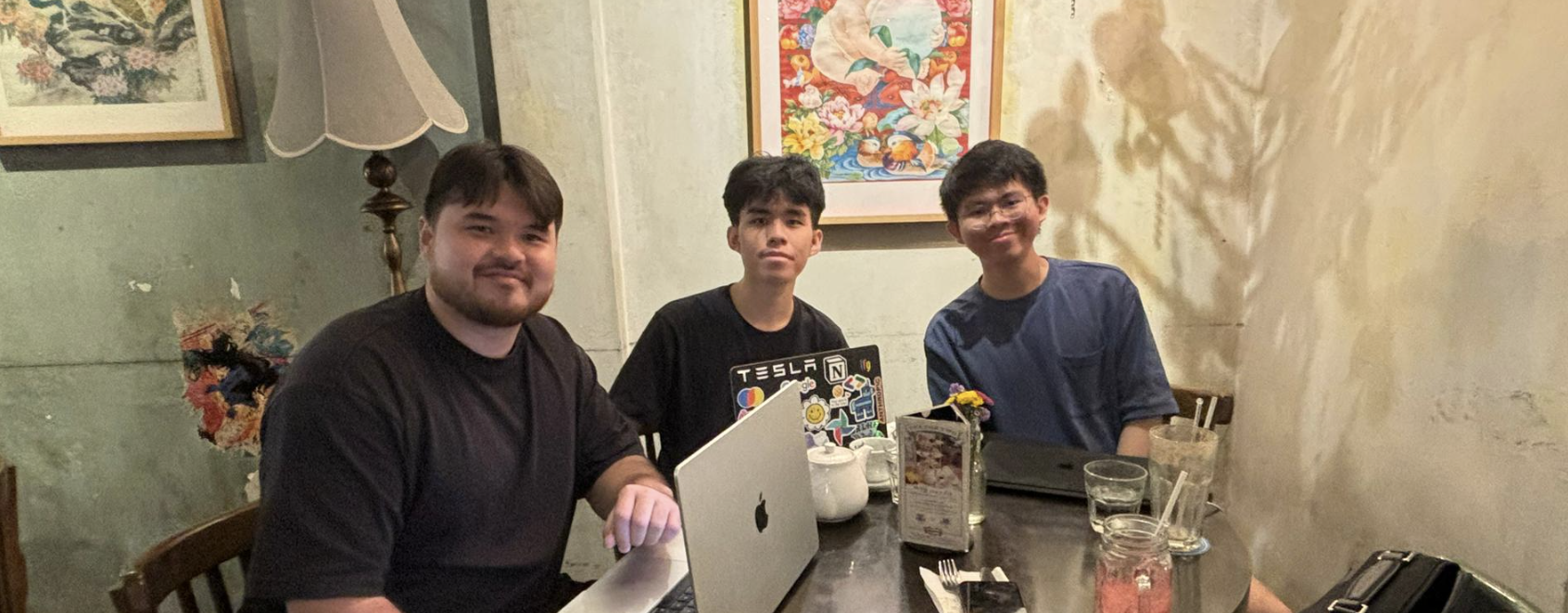 Left to right: Me, Ben, Wei
Left to right: Me, Ben, Wei
Looking back now, it's funny how ordinary that moment felt. Just another conversation over coffee. But that's the thing about building things - you never know which casual comment is going to open up a whole new world of possibilities.
I had no idea then that this simple offer would eventually lead to some of the most intense days of my life. From a small meetup to something that would push me to my absolute limits.
But that's getting ahead of the story.
Let me tell you about the moment I decided to build something completely insane...
The Nine-Day Miracle
"We should do this in Malaysia."
Five words that sparked the fuse of beautiful chaos.
I'd been running AI Tinkers events for almost 3 months, each one feeling more draining than the last. Facebook promotions. Email outreach. All the work that will have you staring at your screen at 2 AM, wondering if you're just shouting into the void.
Then I heard about something called the "Prompt Olympics" happening in New York. Not another panel discussion about AI's potential, but people actually building things. Competing. Learning.
That simple thought - "We should do this in Malaysia" - turned into some of the most intense nine days of my life.
Here's what "simple" meant: Building a real-time scoring system that could handle simultaneous submissions. A tournament bracket system. Live leaderboards. An entire prompt evaluation engine. A medal system that would make the Olympics committee proud.
Oh, and AWS was partnering with us. MoneyLion was watching. And I had nine days.
My house became a chaos engine. Whiteboards filled with system architectures that looked more like modern art. Coffee cups reproducing like bacteria. That particular flavor of silence you only get at 3 AM when you're debugging something that should work but doesn't.
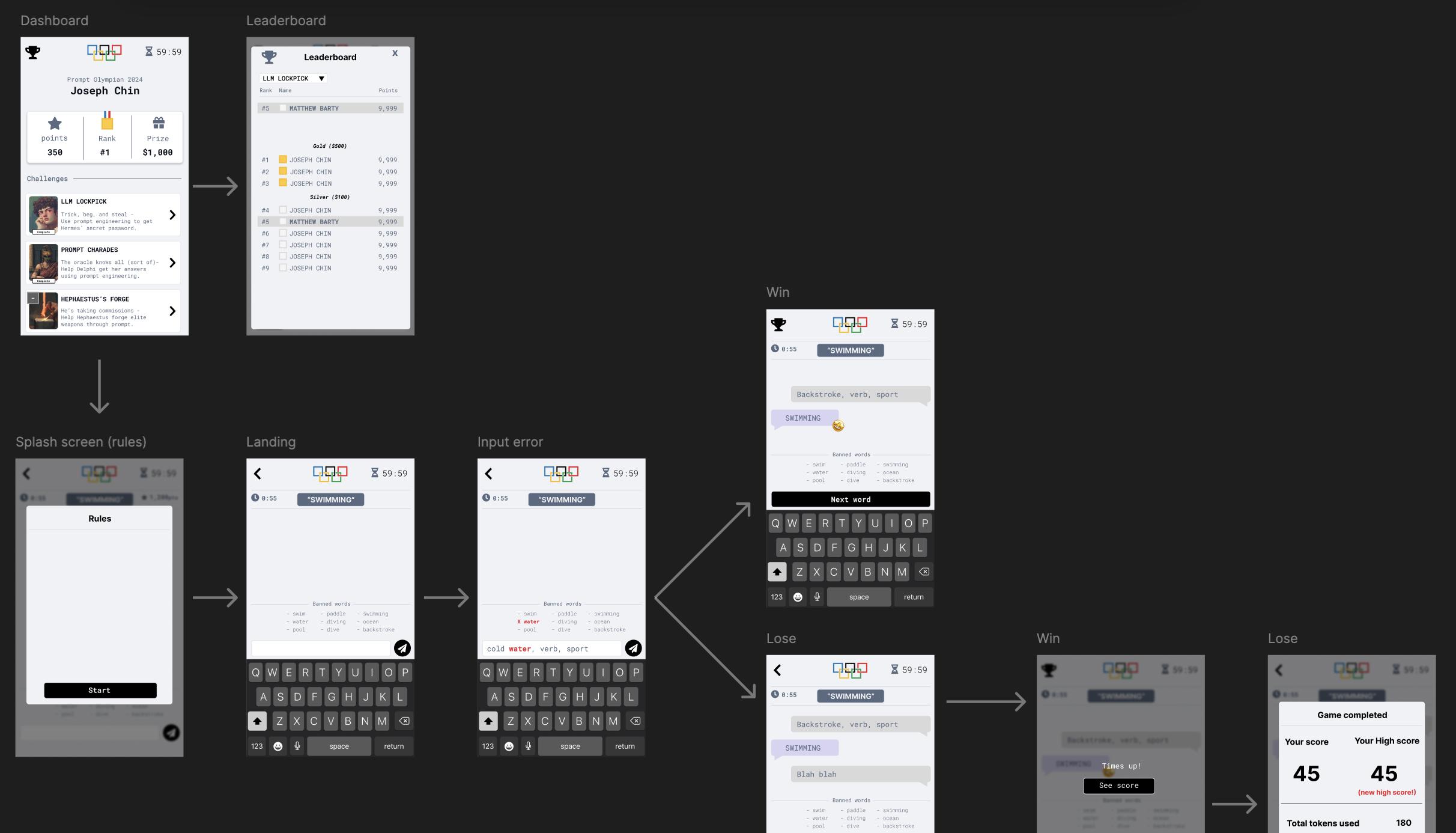 Some Early Prompt Olympics Designs; Shout out: Matt Barty
Some Early Prompt Olympics Designs; Shout out: Matt Barty
The problems kept coming. Scoring system crashing under load. Critical bugs in the tournament progression. Race conditions in the real-time updates. LLM token limits hitting exactly when you don't want them to.
Every time I closed my eyes, I saw the same nightmare: 100+ people showing up, excited to participate, and watching everything crash and burn in real-time. How do you talk your way out of that?
The night before, I ran the final tests. Then ran them again. And again. Each success felt like bargaining with reality.
On the day of the event, I arrived at MoneyLion's office looking like someone who'd been debugging for nine days straight. The space looked ready for something special. I felt ready for disaster.
Then people started arriving. 20, 50, 80... past 120. The platform didn't just work - it purred. The energy in the room was electric. People were doing more than participating; they were creating something entirely new.
 All the amazing AITKL folks Tinkering on the Prompt Olympics Challenge
All the amazing AITKL folks Tinkering on the Prompt Olympics Challenge
I remember standing in the back of the room, watching the leaderboard update in real-time, medals being awarded, and feeling something shift. This wasn't just another tech event. This was proof that Malaysia's tech scene could do more than talk about innovation - we could build it.
After the event, people kept coming up to me: "I've never been to anything like this in Malaysia before.", and I could see a magic look in their eyes. It was recognition. Like they'd been waiting for something like this without knowing it.
Nine days of chaos had turned into something none of us expected. Another piece of the mosaic falling into place, its significance only clear in retrospect.
But the real story? That was just the beginning.
Earning the Title of Tinkerers
The momentary buzz of a successful event has a funny way of testing what you're really about.
After the Prompt Olympics, I started seeing the tech scene differently. Maybe it was the adrenaline wearing off, but suddenly I noticed how many AI events were happening around me. Conferences, panels, networking meetups - all focused on AI's "potential." All very proper, very corporate, very... safe. I'd attend these meetups, watching people nod along to presentations about "AI transformation," while a simple question kept nagging at me:
“Who's actually building anything?”
That's how we ended up pitching something different to YTL and SUPA: a 30-day challenge working on real problems from their operations. Not another hackathon where projects die in GitHub, but something that could actually matter.
The prize pool was serious - RM30,000. But what kept me up at night wasn't the money. It was that same fear from those early events: What if nobody shows up? What if we've misread everything?
The projects that emerged proved we hadn't. Teams who'd barely touched AI before built comprehensive, well-reasoned solutions. More experienced teams presented things that wouldn’t look out-of-place in a Silicon Valley Hackathon.
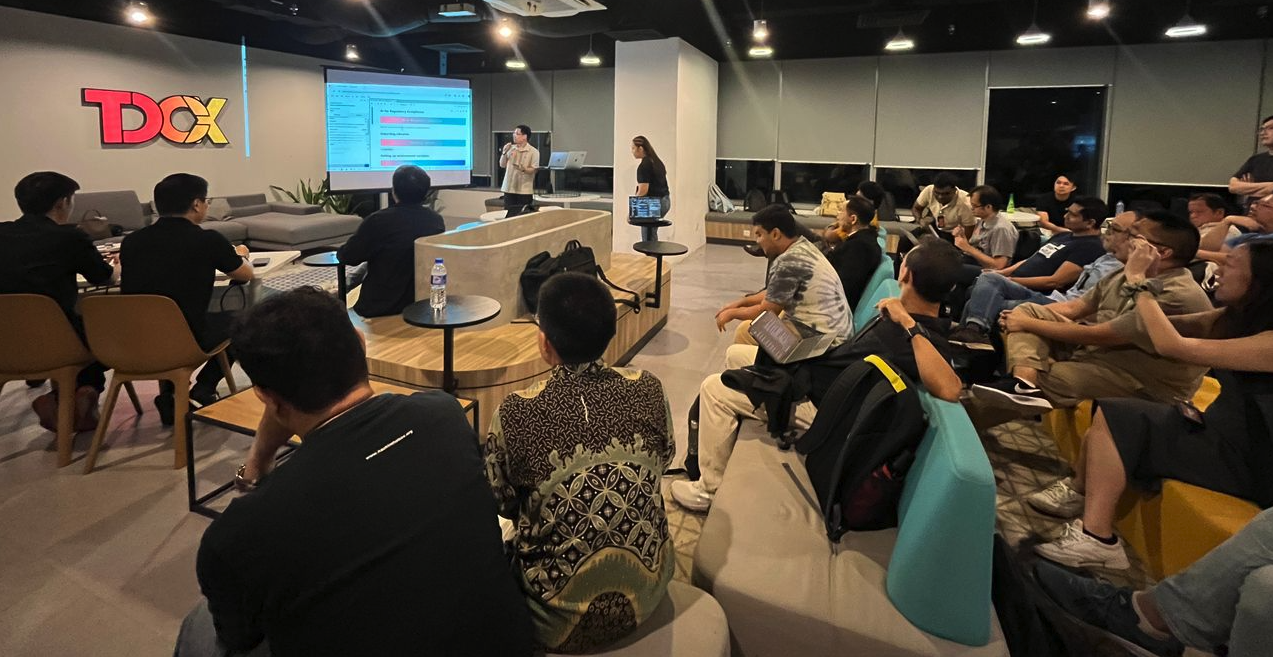 Amirul, one of our OGs presenting his solution
Amirul, one of our OGs presenting his solution
But best of all was that magic dust, that glimmer you see in someone’s eyes when they quietly realise “Hey, wait a second, I can do this.”; when a small crack in the old self-limiting walls we built starts to grow. A community was forming around doing the actual work, not just the talk.
Standing there on demo day, watching barrier-breaking solution after barrier-breaking solution, I thought back to those first few people in a room. How far they'd come. How far we could all still go.
The wind was definitely blowing. And this time it wasn't just luck.
These incredible people had built something together that could catch it.
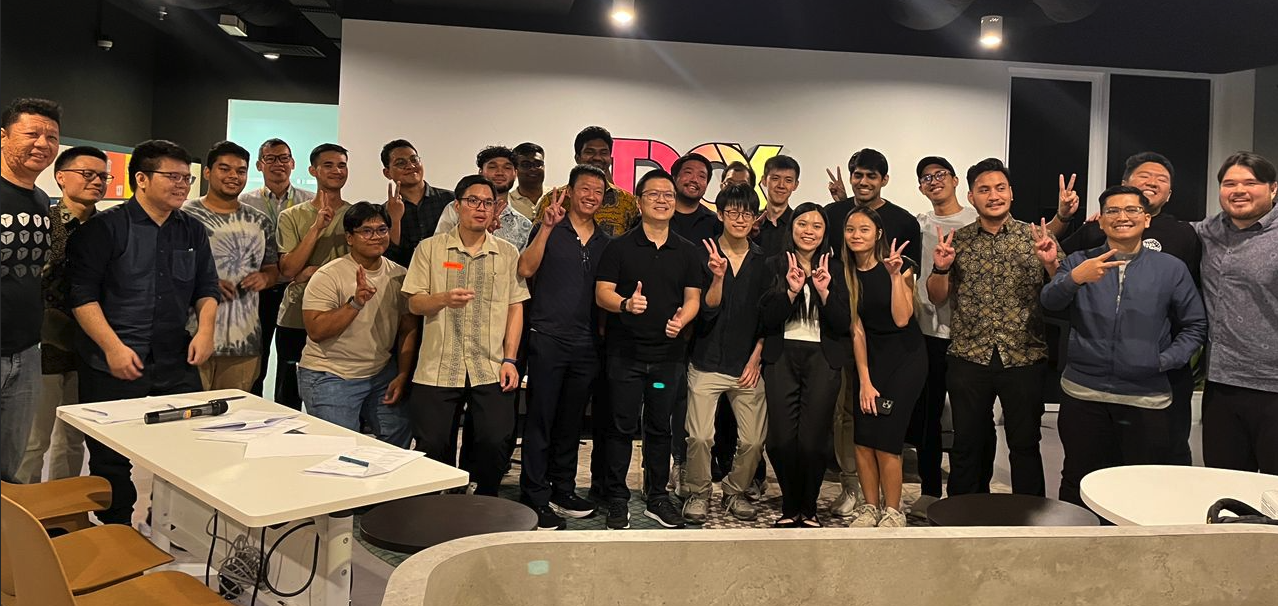 All our Hackathon groups!! Big kudos to these guys
All our Hackathon groups!! Big kudos to these guys
2025?
And that brings us to now. Well, almost.
See, I'm transcribing the skeleton of this post as I prepare to get in the car, heading to meet with a managing partner at 500 Global. They manage $2.8 billion in assets, and somehow, I'm the guy they want to talk to.
A year ago, I wouldn't have known who they were. Six months ago, I wouldn't have had anything to show them.
But today feels different.
Not because of the numbers. Not because of our community.
It's different because I'm starting to see it. Starting to understand. The pieces are coming together, slowly but surely.
So when I walk into that meeting, I'm not bringing certainty or grand visions.
Just hard-earned lessons and a quiet confidence that we might be onto something real.
Whatever comes from this conversation, that's enough.
Because while I'm sitting here trying to find the right words for this meeting, our community is busy building.
Students teaching professionals. Professionals teaching students. Ideas becoming prototypes becoming products. We're looking to launch new AI Tinkerers pillars across KL. Students. Accountants. Healthcare workers. Start-up founders. The whole 60%, because this isn't just about tech people anymore - it's about anyone and everyone who dares to believe that they can.
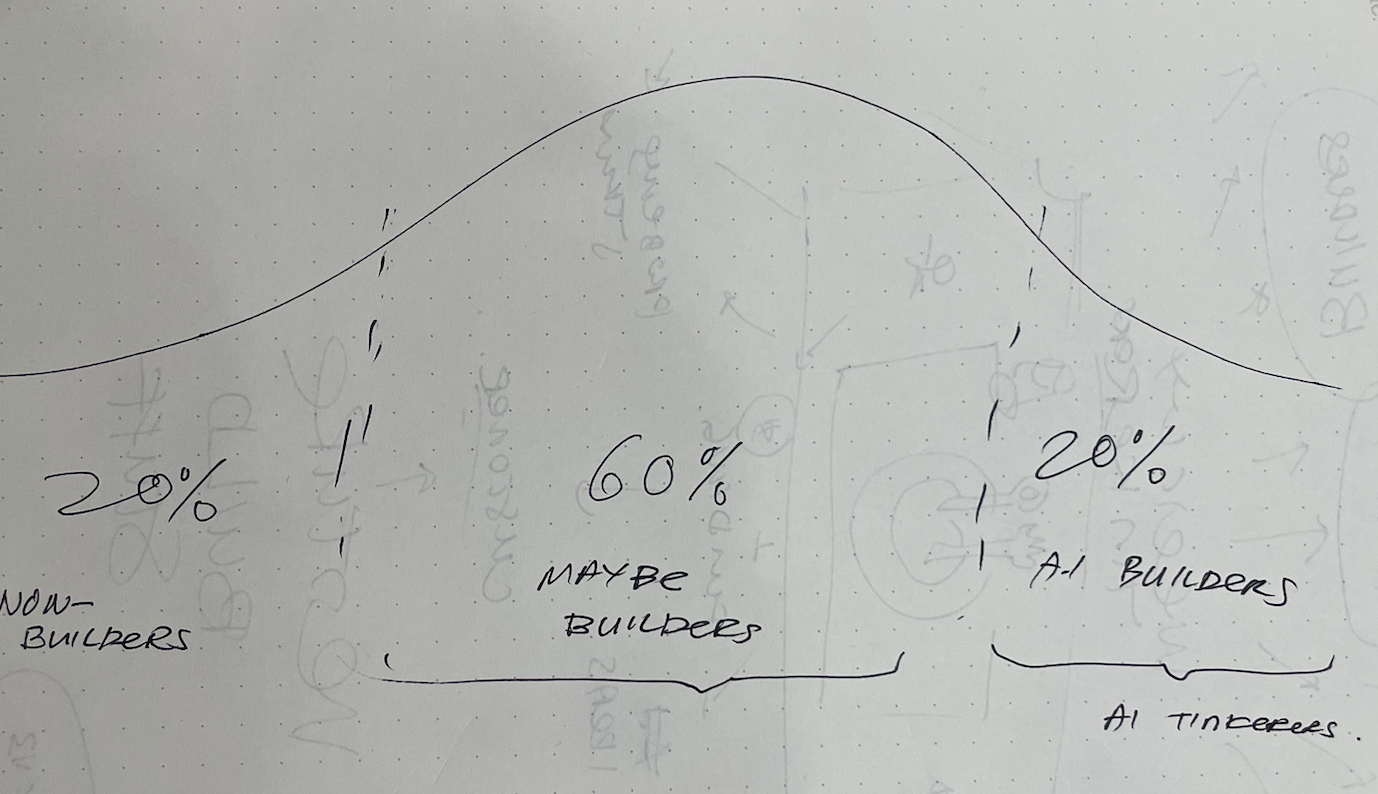 The 60%, visualised by Khailee
The 60%, visualised by Khailee
The vision gets bigger every day. And while size will attract the right attention. I secretly hope AITKL’s 2025 will be more about depth. About creating spaces where "I'm still learning" isn't an excuse to not try, but a badge of honor for those willing to start.
Looking back at this mosaic now - the gut punches, the miracles and all the monotony in-between - I can finally see the pattern. It was never about the calculations. Not really.
See, in London, I was counting down. Measuring the distance between where I was and what mattered. Trying to calculate how many moments I had left. But that's the thing about time - you can spend it counting down, or you can spend it building up.
Every piece of this mosaic - from those early "nice project" pats on the back to watching a new builder’s eyes light up- they're all moments we created. Not moments we lost.
And maybe that's the real miracle.
Not that the wind happened to blow in the right direction.
Not that some random kid from nowhere cluelessly stumbled into the right place at the right time.
But that when you stop counting what you might lose, and start building what others might gain...
The numbers only go up.
Here's to all the moments we'll build together. To every person who's been part of this story - who's contributed more than I could ever repay, who's believed in something bigger than themselves.
And to think...
It all started with a simple question about time.